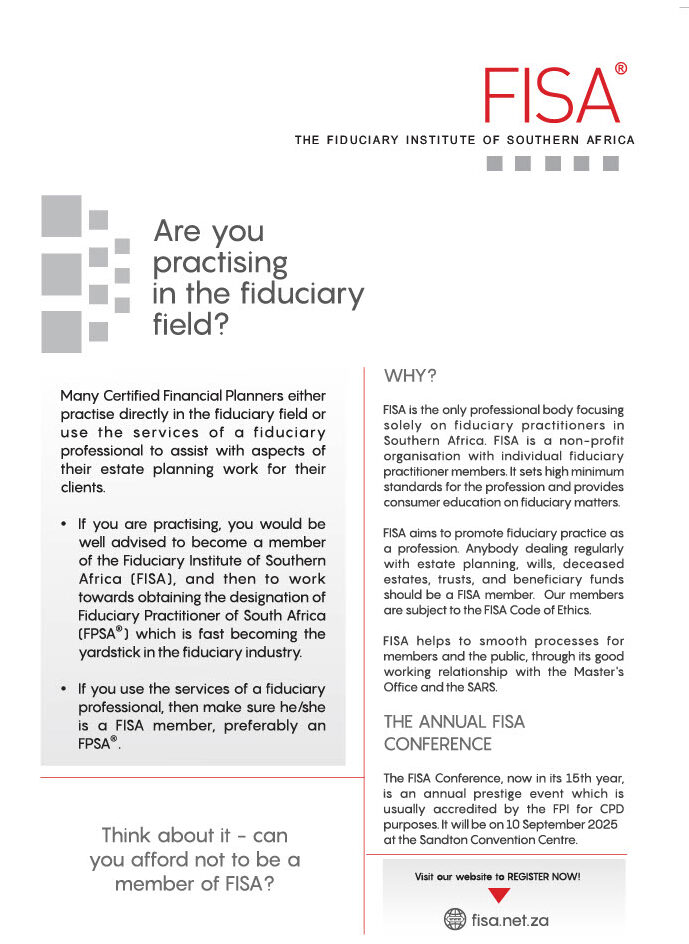By Louis van Vuren, CEO, the Fiduciary Institute of Southern Africa (FISA)

Fiduciary and fiduciary services became more well-known over the last two decades, specifically in the financial planning environment. This raises the question: what exactly are these services and the inherent duty that goes with them?
The short answer is that a fiduciary service is any wealth creation or -protection service where a person manages or looks after the affairs of another in circumstances where the client or beneficiary is not in a position to oversee the service provider’s actions. This service provider is then called the fiduciary.
Therefore, if someone is appointed as an executor in a deceased estate, or a trustee in a trust, or a curator, tutor or administrator to manage the affairs of a minor or mentally incapacitated person, such appointee becomes a fiduciary and is subject to a so-called fiduciary duty.
In short, fiduciary duty is the obligation to act with care, diligence and skill, and in the best interest of the person(s) whose affairs are managed. As a result, a fiduciary must always avoid conflicts of interest, i.e. any situation where the fiduciary’s personal and financial interests can impact negatively on the best interests of the client or beneficiary.
Fiduciary duty is found in many other situations, e.g. the duty a director owes to a company and its shareholders to maximise profit in a sustainable way, the duty a board member of a retirement fund owes to the members of the fund and their dependants and beneficiaries, and the duty a public functionary like a municipal manager owes to the citizens of the municipality. If a conflict is unavoidable it must be declared.

Have you registered for the FISA conference yet?
The FISA Conference, now in its 15th year, is an annual prestige event which is usually accredited by the FPI for CPD purposes. It will be on 10 September at the Sandton Convention Centre.
Who is qualified to render these services?
One of the cornerstones of our law is that you are judged by the standards that you profess. If you act as trustee, you are expected to act as a reasonable trustee – not as the reasonable “man-in-the-street.” Although there are no qualifying criteria for trustees in legislation, there are grounds upon which a person can be declared to be unfit to take up trusteeship. Examples are if the person has been convicted of a crime which involves dishonesty, or has been declared by a court to be unfit to serve as a director of a company, or appears on a financial sanctions list of the UN Security Council, and many more listed in the Trust Property Control Act, 1988.
Attorneys, trust companies, accountants, and some private individuals may act as executors in deceased estates under a regulation made in 1968. Any person nominated in the last valid will of a deceased person may also take up executorship in that estate.
For many years the Attorneys Act, 1979, provided that only attorneys, advocates, trust companies and a few others may charge a fee to draft wills. When the act was repealed by the Legal Practice Act, 2014, these provisions fell away and any person can now charge a fee for will drafting. However, it is not recommended unless the person has a fundamentally sound knowledge of the law relating to wills, deceased estate administration, trusts, and quite a substantial body of law that impacts on estate planning. A lay person in this field can cause serious damage in this complex technical field. In the case of Raubenheimer v Raubenheimer and Others ([2012] ZASCA 97) judge of appeal Leach remarked:
It is a never-ending source of amazement that so many people rely on untrained advisors when preparing their wills, one of the most important documents they are ever likely to sign.
A will is also not a commodity or the starting point of estate planning – it is the end product of a proper estate plan and needs to be aligned with the rest of a person’s financial plan.
Although financial advisers are more aware of the need for proper estate planning than twenty years ago, it is still not the most popular part of financial planning as it is more difficult to explain the value of a proper estate plan than to explain the value of investment advice.
A proper estate plan is essential, with the added advantage that it fosters long term relationships between advisers and clients.
Editor’s thoughts
Louis van Vuren offers an authoritative and deeply practical guide to understanding what fiduciary duty truly entails, and why it must be taken seriously. His piece reminds us that fiduciary services are not just legal formalities but fundamental pillars of ethical financial stewardship. With clarity and conviction, he points to the dangers of DIY estate planning and the real damage that can result from poorly drafted wills and unqualified advice.

